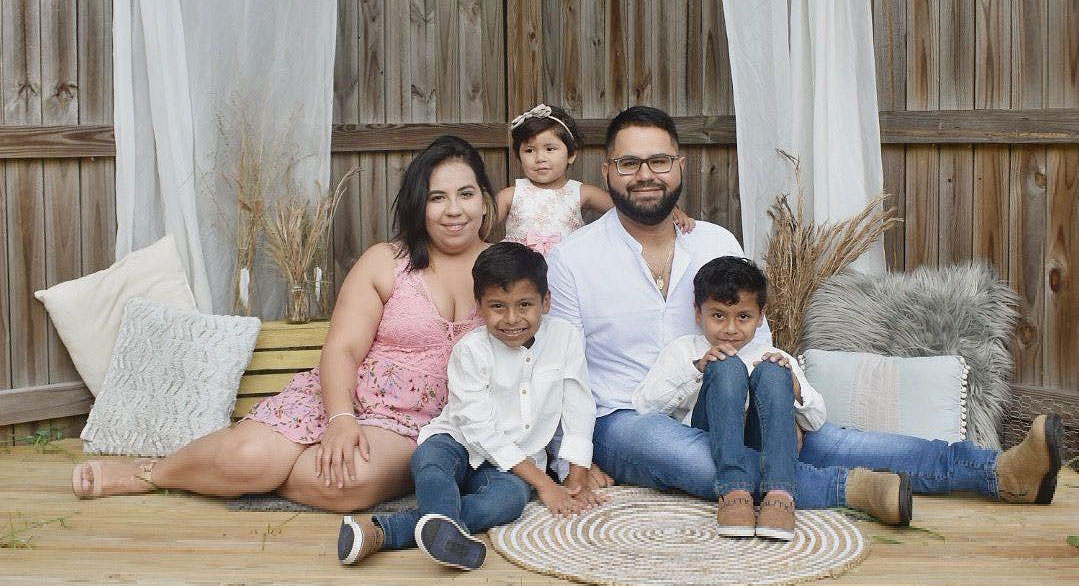The Power of Latino Entrepreneurship

Entrepreneurship wasn’t a skill handed down to Mariela Garcia by generations of enterprising ancestors. But in the few years since she started Maredu Photography with her partner, Eduardo Maldonado, she’s found the freedom of owning a business both liberating and profitable.
“I saw my parents work hard and struggle every year to make ends meet for my sister and me,” remembers Mariela, who lives in Fellsmere, Fla., with Eduardo and her three children. “When I had my kids, and then when Eduardo came into my life, I knew I wanted something better. We decided to turn my passion into something and see where it would go, and so far, everything is working out.”

Eduardo Maldonado lifts 10-year-old twins Joel and Jonas on his shoulders. The photography business he owns with partner Mariela Garcia has provided the family with more financial security. “I don’t want to call it stability yet because it’s not,” Eduardo says. “It’s more like ‘managed instability.’”
Mariela and Eduardo’s story is part of a strong trend in the Latino community: Over the past decade, Latinos have started new businesses at a staggering rate. In 2023, 36% of new businesses in the United States were opened by Hispanics, according to an analysis of census data. That’s double the group’s representation in the U.S. population. And 20% of respondents to the National Latino Family Report’s survey said they opened a new business in 2024 alone.
Not only do these businesses provide vital services to the communities in which they operate, but they’re also an economic powerhouse. In 2022, Hispanic-owned businesses generated $654 billion in revenue.
And yet, structural barriers have made it hard for some Latino business owners to scale their enterprises, access funding, and hire and retain talented employees. A 2024 McKinsey study estimates that creating a more supportive environment for Latino entrepreneurs could help generate $1.2 trillion in revenue and create between 5 million and 6 million new jobs over the next few decades.
‘Managed Instability’
For Mariela and Eduardo, the benefits of entrepreneurship have extended beyond creative fulfillment. It’s helped them build a better life for their family. Mariela is the mother of 10-year-old twins, Joel and Jonas, and 5-year-old daughter Luna.
Like so many families who participated in our survey, Mariela and Eduardo have worked hard to combat rising costs over the past several years. Raising children is increasingly expensive nationwide. (In Florida, the average cost of full-time childcare is more than twice the cost of in-state tuition at most universities.)

Twins Joel and Jonas, 10, and 5-year-old Luna, lounge at a cafe a few years ago. Eduardo and Mariela regularly encourage their kids to become entrepreneurs. “It’s genuinely the best way to go,” Mariela says. “It’s so rewarding to be proud of what you’re doing.”
When they’re not editing photos or setting up shoots, Mariela works as a medical assistant at a podiatry office, and Eduardo manages the apartment complex where they live. Their salaries have not kept pace with inflation, they say, but their side business has helped them close the gap and survive more than a few financial rough patches. They’re able to put food on the table for their kids, who love to eat healthier (and often pricier) food like eggs and fruit. And the family’s days of overdrafting their bank account are mostly behind them.
“I don’t want to call it ‘stability’ yet because it’s not, and it won’t be for a couple of years,” Eduardo says. “It’s more like ‘managed instability.’” Mariela and Eduardo are among about 24% of Latino families who say their personal financial situation has improved over the past year.
Still, they feel uncertain about the future. Eduardo says he’s already seeing the impact of tariffs in his Amazon cart. Latino families who took our survey echoed that sentiment. Just 28% of respondents think the federal administration’s economic policies will benefit their family’s bottom line, while 39% feel optimistic about the administration’s impact on the U.S. economy overall.
Surveyed families indicated broad buy-in for social supports — things like paid family medical leave and an expanded Earned Income Tax Credit (EITC) — which have been shown to lower the cost of labor and stimulate local economies. Nearly 9 in 10 respondents said they would support expanding the EITC to provide $5,000 per child per year, paid quarterly.
Supporting Latino Entrepreneurs
As their wedding-photography and portraiture business has grown, Eduardo and Mariela have used Mariela’s annual tax refund to invest in their business, purchasing new gear and upgrading old equipment. Having that bulk sum “really did speed things up for us, thank God,” Eduardo says.
Additional support from government and private institutions — and especially improved access to capital — would help even more, they say.

Mariela Garcia’s kids, Joel and Jonas, 10, and Luna, 5, pose for a golden hour portrait. Mariela and her partner, Eduardo Maldonado, own portraiture and wedding-photography business Maredu Photography in Fellsmere, Fla.
As of 2023, there was a $200 billion lending gap between Latino-owned businesses and their White counterparts. Latino business owners are approved for loans 15% less often, and when their credit requests are approved, Latino business owners are more likely to receive less than the full amount requested.
Studies have suggested gaps in educational attainment and cultural fluency can prevent Latino-owned companies from thriving, too, especially when owners are immigrants or have limited English proficiency.
Bridging these gaps will require creative problem-solving and collaboration between the private sector, government agencies, and nonprofit organizations, but will further expand the positive (and outsized) impact Latino entrepreneurs have on the U.S. economy overall. Targeted scholarships and grants can help aspiring Latino entrepreneurs build skills and financial literacy, while community-based networking organizations can allow new business owners to share knowledge and navigate licensure and other bureaucratic processes.
With Maredu Photography thriving and all of their kids in school, Mariela and Eduardo are dreaming of a future where their 9-to-5 and their passion project are one in the same. It will take 5-10 years of scaling up — and somewhere near a six-figure annual profit — to reach the point where the couple can safely devote their careers to photography. Until then, they’re balancing their busy schedules as best they can and imparting their newfound spirit of entrepreneurship on their kids.
“We talk about it, and we definitely tell them, ‘If you ever want to start a business, it’s genuinely the best way to go,’” Mariela says. “‘It’s so rewarding to be proud of what you’re doing.”
